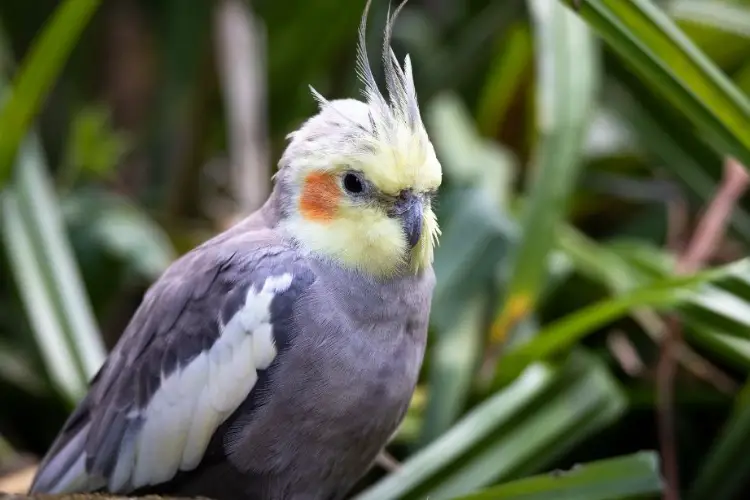As a cockatiel owner, you will always notice something new about your bird. Some of the cockatiel’s behaviors may be unusual and cause you to be concerned because you do not understand what they mean. Shaking or shivering is one of these behaviors. Let’s take a look to see if it’s cause for concern.
Why is my cockatiel shaking or shivering? Shaking is normal cockatiel behavior. Excessive shaking and shivering could indicate that the bird is overly excited, stressed, or excessively cold. Also, the bird could be sick, but you should look for signs of illness before becoming too concerned. When sick, they usually hide, but if the cockatiel is shivering, it could be very ill.
Most birds, subtly or blatantly, exhibit body language, making it imperative for bird owners to pay close attention. That is how birds express their wants and needs. Continue reading to learn the possible causes of your cockatiel’s trembling.
Why Is My Cockatiel Shaking or Shivering?
Trembling, puffing, quivering, and shivering are all synonyms for shaking. In a healthy cockatiel, slight shaking is expected. Many cockatiel owners notice their bird shaking and believe something is wrong with it when, in fact, it is normal behavior.
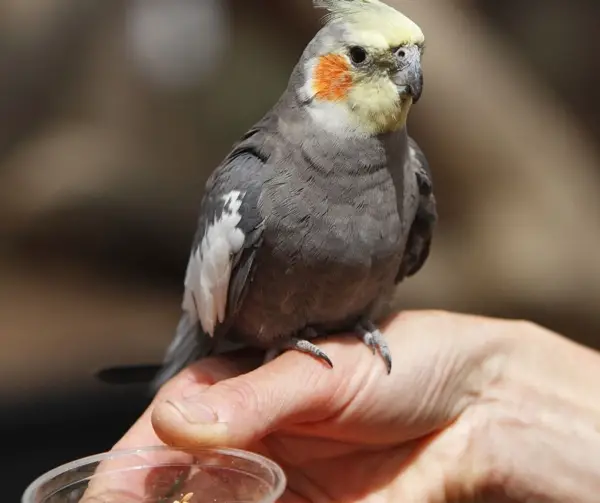
Humans, like cockatiels, shiver, but it is not always recognizable. When birds shiver, their legs and wings tremble more than the rest of their bodies. Here are six possible explanations for your cockatiel’s tremors.
1. Low temperatures
It may be due to cold temperatures if you observe your cockatiel shivering at night. The proximity of the cage to a window or taking a bath could cause a feeling of chilliness.
To prevent this, bathe the cockatiel during the day instead of before it goes to bed. During the day, the cockatiel will rapidly dry out due to the warmer air. Additionally, monitor the temperature of the room. The ideal temperature range for cockatiels is between 60 and 80 degrees Fahrenheit.
If you observe that the room temperature is too low, gradually increase it, so the cockatiel does not experience shock.
2. Illnesses
When a cockatiel is ill, shaking is accompanied by lethargy, wheezing, tail-bobbing, and runny feces, and the bird remains at the bottom of its cage. Shaking from sickness is more pronounced than shaking due to any other reason. You may also notice the cockatiel falling from its perch due to a loss of equilibrium.
The cockatiel’s feathers will be ruffled even at the optimal room temperature. Take the cockatiel straight to the veterinarian for evaluation.
3. Stress
To know the cockatiel is stressed, you must know how your cockatiel behaves under normal conditions. That means you must be a keen observer because most cockatiels will hide their emotions of fear, sickness, or stress. In the wild, cockatiels mask their fears not to appear vulnerable to predators.
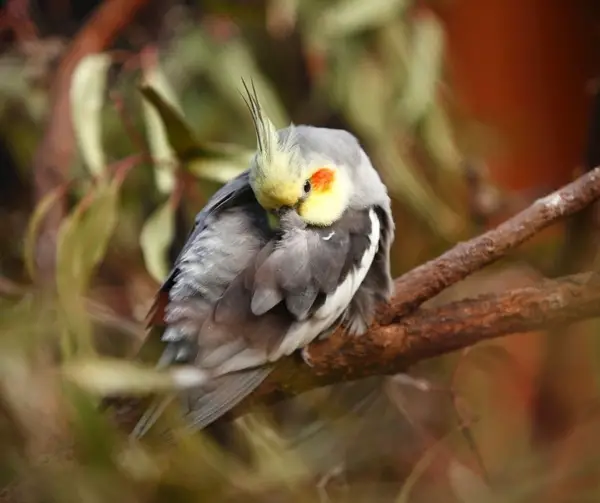
So, the cockatiel may also be injured or in pain which causes it to become frustrated, thus shaking. You will also observe the bird has ruffled or fluffed feathers. Several issues can cause stress in birds. They include;
- Being in a new environment
- Presence of a stranger or pet, such as a dog
- Changing the room’s color
- Loneliness
- When the cockatiel is not getting attention from you or boredom
- Predator birds flying by the window
- Changing the cage’s position
- Loud or sudden noises
4. Excitement
Shaking does not always indicate that your bird is in distress. When a cockatiel is happy, it trembles. For example, when it is feeding or playing time or when it sees you after a long day. The cockatiel will shiver slightly, primarily with their head or wings. You should be happy if your cockatiel does that because it shows you two have a strong bond.
5. Relaxation
Before the cockatiel sleeps, it shakes or ruffles its feathers to prepare itself for rest. This type of shaking should not be a cause for alarm. Also, after grooming, the cockatiel will shake its feathers to realign them and remove any remaining debris from its wings.
6. After bathing
After bathing, the cockatiel shakes slightly. It shivers as a result of the temperature change and dries itself. Again, there is no need to be concerned. It is only temporary and will end when the bird dries.
How Can I Help A Shaking Cockatiel?
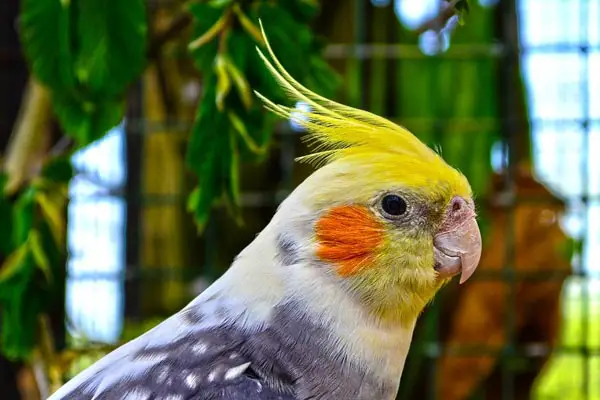
Let us look at what you can do to help a trembling bird.
- Purchase a space heater, heating lights, or a heated perch. These two appliances ensure your bird is always warm, even in cold seasons. However, when leaving your house, turn off the heated perches.
- Avoid keeping your cockatiel’s cage near windows where cold air comes in. instead, place it in a warmer section in your house until the cold season is over.
- Ensure you feed your bird with enough food. A well-nourished bird has a lesser chance of being too cold. Old or sick birds tend to be very susceptible to freezing.
- Maintain a calm environment with little or no noise. That way, your cockatiel will not get stressed.
- Ensure pets like dogs and cats are not in the same vicinity as your cockatiel.
- If the cockatiel is sick, take it to a veterinarian for a check-up. To help it recover quickly, ensure it is in a warm room and has easy access to fresh water and food.
- Spend time with your cockatiel to ensure it does not get stressed due to loneliness.
- Add toys or another cockatiel to your cockatiel’s cage that will entertain it when you are away. These adjustments will counteract boredom.
Also read: Why Is My Cockatiel’s Nose Red?
Why Is My Cockatiel Shivering All The Time?
Excessive shaking indicates that something is wrong with the cockatiel. It is not normal, and you should take the cockatiel to the veterinarian immediately. It could result from a cold, pain, illness, or fear.
A cold cockatiel will shiver when trying to generate more heat. This may be due to the cage’s proximity to an air conditioning vent or a window. A lot of cold can make your cockatiel very sick and even kill him.
When a cockatiel is infected, its body will try to combat it by producing more heat. The cockatiel may shiver violently during this process.
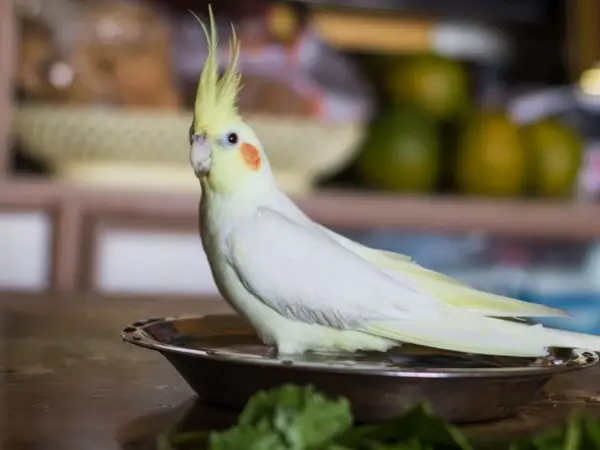
Fear can also cause your cockatiel to shiver constantly. For example, if the cockatiel is in a new environment or the house is always noisy. So, make sure to provide a comfortable environment for the cockatiel, and it will adapt to its surroundings over time. Also, make sure there are no loud noises and keep your dog away from the bird room.
Depending on the severity of the wound, the cockatiel’s body will shake if it is in pain. Pain also raises the cockatiel’s blood pressure, which causes the cockatiel to become distressed, resulting in constant shivering.
Why Is My Cockatiel Shaking Its Tail?
Tail-shaking is normal cockatiel behavior. If your cockatiel has a strong bond with you, it will wag its tail in excitement every time you appear. In other circumstances, the cockatiel will shake its tail hostilely, especially if irritated. You can easily misinterpret these two instances, especially if you are a new cockatiel owner.
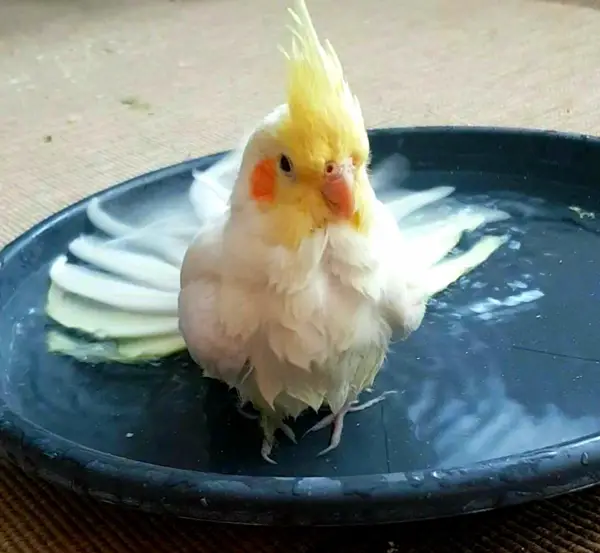
The only time tail-shaking should worry you is when the cockatiel bobs the tail up and down. Cockatiels mainly do that when they are sick. It is a rhythmic movement that corresponds to how the cockatiel breathes.
Why Is My Cockatiel Shaking Its Head?
Unlike humans, birds use body language to communicate. When a cockatiel shakes its head, it usually signals to its mate. Head shaking is part of cockatiel’s mating rituals. However, baby cockatiels bob their heads to show that they are hungry.
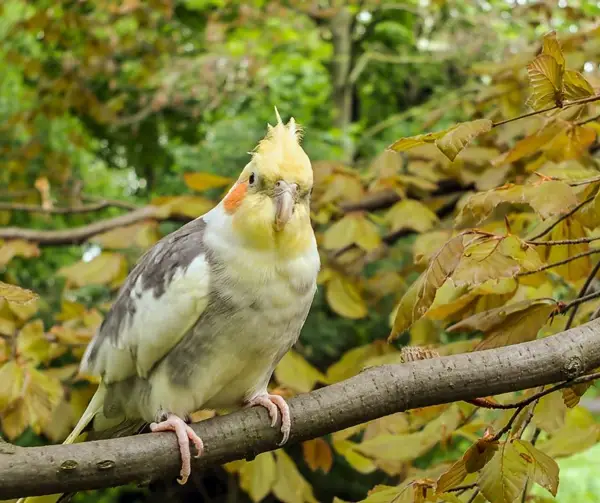
In some cases, a hormonal female cockatiel will shake its head to communicate that it needs time alone. It mostly happens during nesting. The head shaking is accompanied by hissing or wing flapping. Also, when food gets stuck in the bird’s beak or crop, it will bob its head up and down to unlatch the piece.
Why Is My Baby Cockatiel Shaking?
As previously stated, baby cockatiels ask for food by shaking their heads. This trembling is accompanied by shrill chirping. Furthermore, baby cockatiels’ bones are weak at birth, so they shake when learning to walk and control their muscles.
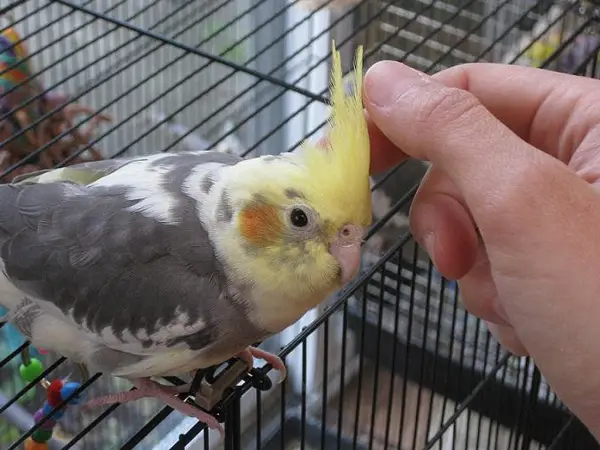
Baby cockatiels may shiver if exposed to excessive cold, ill, or scared. If you raise the chicks without their mother, keep the room temperature around 90 degrees Fahrenheit.
FAQs
Here are other frequently asked questions.
Yes, it is normal for cockatiels to shake. Sometimes the cockatiel shakes when they are excited and when getting ready to sleep. You will notice that this type of shaking is slight. However, if the shaking becomes excess, something else is bothering the cockatiel.
Cockatiels shake their wings after preening to remove any dust or unwanted feathers. They also shake their wings during the breeding season to attract a mate. When scared or irritated, the cockatiel will flap its wings and hiss to express its feelings. Cockatiels also flutter their wings during molting to help pin feathers grow.
Related: Why Is My Cockatiel Biting Its Cage?
Conclusion
Do not be alarmed if you notice your cockatiel shaking slightly. It could be due to excitement, the bird’s desire to rest, or after grooming. The only time you should be concerned is when the shaking is excessive. It may indicate that the cockatiel is ill, cold, stressed, or bored.
If it is due to cold, provide enough heat for the cockatiel. Take your cockatiel to the vet for an examination to ensure it is healthy.
